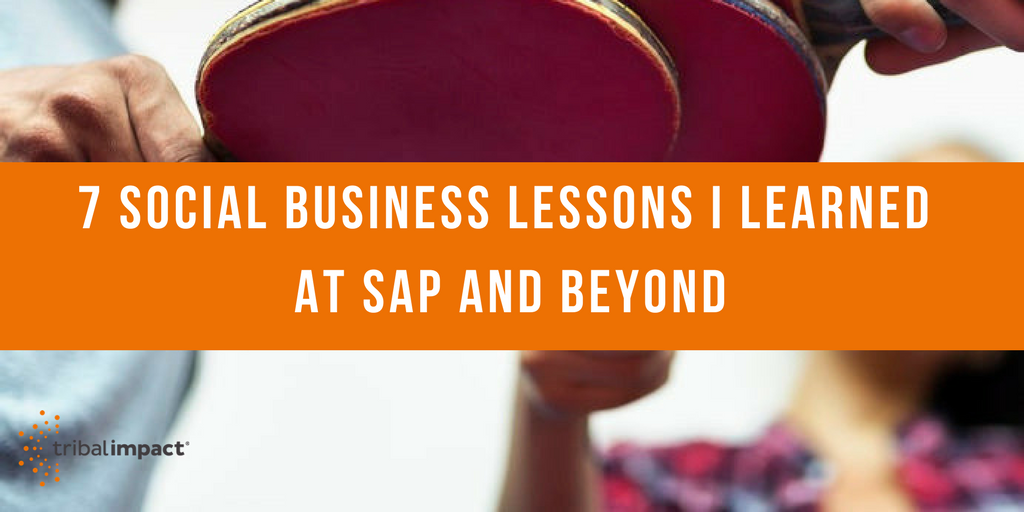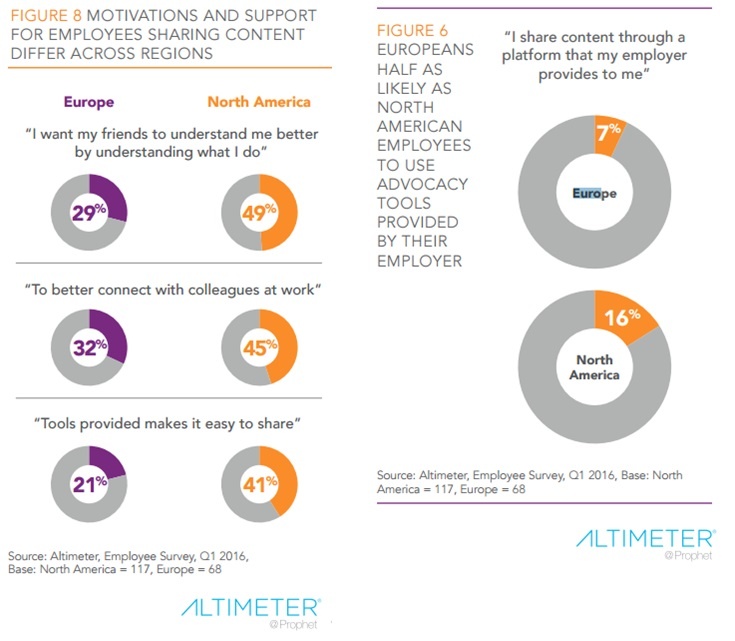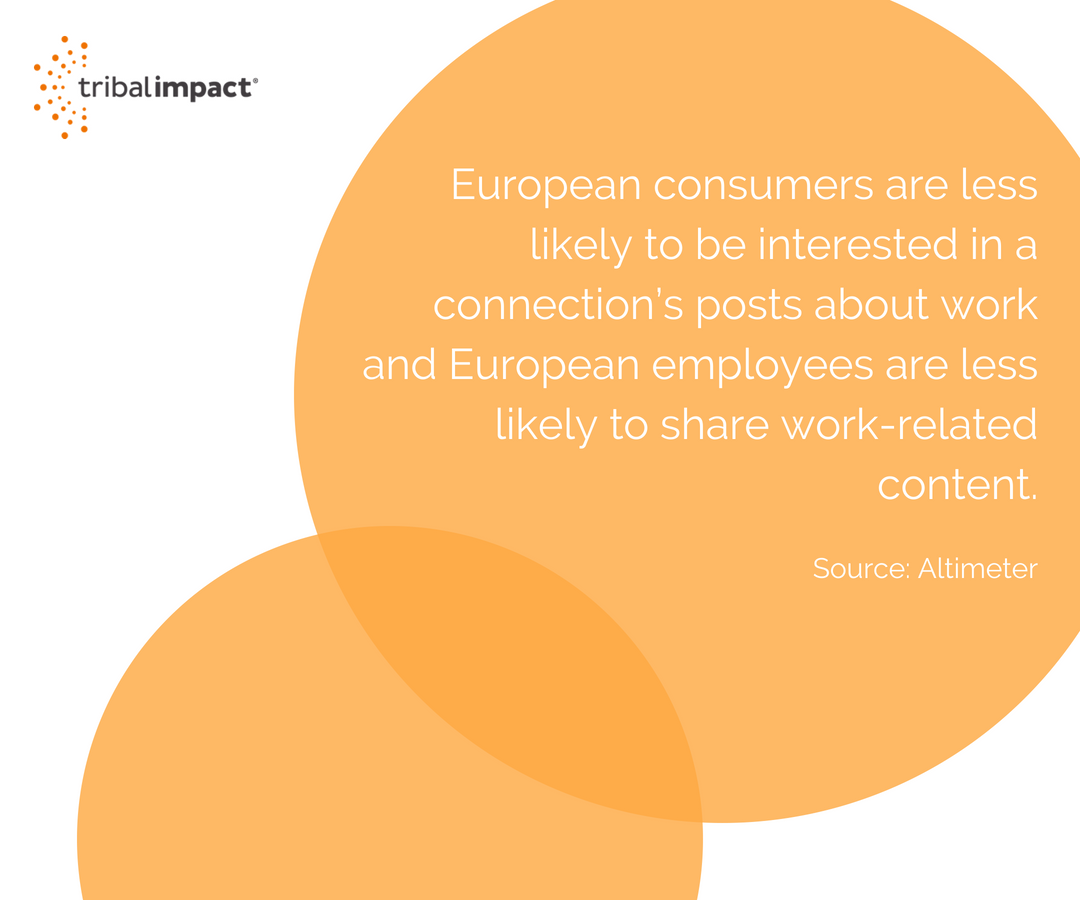 This morning I had the great pleasure to present to a European leadership team of a tech company about the value of social business lessons. One particular question caught my attention. What's my experience of working across different countries and industries?
This morning I had the great pleasure to present to a European leadership team of a tech company about the value of social business lessons. One particular question caught my attention. What's my experience of working across different countries and industries?
On the drive home, it made me think about just how much I learned both from my time at SAP and beyond. How social selling adoption rates vary by industry, how social media differ from country to country and how social business training needs to adapt to meet the needs of different generations in the workforce.
Europeans tend to lag North America when it comes to employee advocacy/social business adoption. According to a recent Altimeter study, European consumers are less likely to be interested in a connection’s posts about work and European employees are less likely to share work-related content.

You see, Europeans have a stronger preference for keeping work and home life separate: 44% of Europeans cited this a reason for not sharing work-related content, compared to only 23% of North Americans.
We walk a fine line here in Europe. Pumping branded content via employee networks simply won’t work - just one of the lessons I learned. Here are some more...
A One Day LinkedIn Workshop isn't Social Business Lessons.
It’s true. Whilst training is going to be a core part of your social business transformation program, it’s not the only part. You need tools, content and a holistic program that works to serve the entire business. Transformation happens over time. Build a program that employees can join when they’re ready…there’s the key…when they are ready! Brings me to my next point.
"Thou Shalt Become Social" - Don’t Set An Employee Mandate.
You cannot force employees to be social. Setting KPIs, objectives and performance targets around their social media activity is pointless. Been there. Done that. Doesn’t work. Instead, work with those that want to get involved and at every stage of your program, incentivise them to take the next step. Forget gamification and “points mean prizes” approach. If employees invest time in learning, reward them with ‘exclusive’ tools or experiences that help them improve and bring them closer to the brand.

Share The Triumphs. Even The Small Ones.
It’s easy to pass over even the smallest wins as ‘lucky’ or ‘coincidental’ but they’re not. When someone is approached to speak at a conference or a new employee was hired because of another employee sharing the job post, that’s a social business triumph. Nominate someone to capture social success stories and share them. This communication structure needs putting in place right at the start. Revisit the program members and share their experiences.
Not Everyone Starts At "Social Zero".
Know your employees. You’ll have all sorts in the organisation ranging from ‘social zero’ to ‘social hero’. Don’t assume every employee starts their social journey from the same place. Many people already have large networks but aren't that socially active. A small nudge in the right direction can make a huge impact. Likewise, you’ll have others hugely motivated and enthusiastic who don’t know where to start. Profile your employee landscape and start from there. Our Social Impact Quiz can help you do this.
Power To The People.
There’s nothing more powerful than when your employees start inspiring and even coaching others in the same successful direction. This was a “eureka” moment for me at SAP. Our community of social employees started supporting each other. Questions were being answered by them before the administration team got to them. This is social learning (or I guess social business) at its best. Make sure there's a platform available for social learning and collaboration internally.
Sales & Marketing Need To Get “Inbound” Together.
I truly believe social business will bring both sales and marketing together under a common objective - conversion. No more pushing. It’s all about attracting people to the brand through content (marketing) and experts (sales). This approach will yield better-qualified leads, higher conversion rates, shorter sales cycles and in some cases increase deal sizes. Isolated programs will need more effort in the long run, which brings me to my next point…
Social Silos Don’t Work.
I understand why social selling gets most of the attention. Sales is often the heart of every business – without paying customers a business doesn’t exist. However, a heart is no good without a body. Cutting off the rest of your organisation from the true value social business can yield, is a mistake. Marketing needs to create relevant content – sales have the insight. Your Solution Experts have the knowledge to create great content – marketing needs it. Your entire workforce has the power to promote the employer brand and attract top talent. Go big.
======================================================
These are just some of the lessons I've learned but I'd love to hear from others who have experienced similar or different to the ones above. Jot them in the comments below.
What is your social media impact? Click here to take the quiz and find out.
